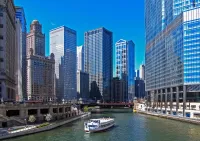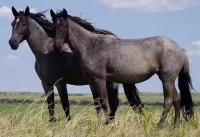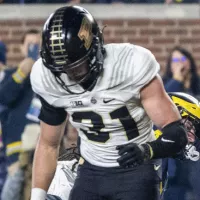The Kentucky Derby is a prestigious Grade I stakes race held annually at Churchill Downs in Louisville, Kentucky. It features three-year-old Thoroughbred horses competing over a distance of 1 1/4 miles. Colts and geldings carry 126 pounds, while fillies carry 121 pounds. Known as "The Most Exciting Two Minutes in Sports," it is the first leg of the American Triple Crown and is steeped in tradition and pageantry. The Derby is a significant event in American culture, attracting large crowds and generating considerable media attention.
1902: Matt Winn Acquires Churchill Downs
In 1902, a syndicate led by Col. Matt Winn of Louisville acquired Churchill Downs. Under Winn's leadership, the Kentucky Derby prospered and became the preeminent stakes race for three-year-old thoroughbreds in North America.
1921: Tradition of "My Old Kentucky Home"
In 1921, the tradition began of the University of Louisville Cardinal Marching Band playing Stephen Foster's "My Old Kentucky Home" as the horses parade before the grandstands.
1930: Term "Triple Crown" Comes Into Use
In 1930, after Gallant Fox became the second horse to win all three races, sportswriter Charles Hatton brought the phrase "Triple Crown" into American usage.
1931: Kentucky Derby Date Change
Starting in 1931, the Kentucky Derby date was changed to the first Saturday in May, allowing for a specific schedule for the Triple Crown races. Since 1931, the order of Triple Crown races has been the Kentucky Derby first, followed by the Preakness Stakes and then the Belmont Stakes.
1937: Official Naming of Churchill Downs
In 1937, the name of the racetrack, Churchill Downs, became official. The track was named after John and Henry Churchill, who provided the land.
May 7, 1949: First Television Coverage of the Kentucky Derby
On May 7, 1949, the first television coverage of the Kentucky Derby took place. It was produced by WAVE-TV, the NBC affiliate in Louisville. This coverage was aired live in the Louisville market and sent to NBC as a kinescope newsreel recording for national broadcast.
1968: Dancer's Image Disqualification
In 1968, Dancer's Image became the first horse to win the race and then face disqualification after a urine test revealed traces of phenylbutazone. Forward Pass was declared the winner after a legal battle.
1970: First Female Jockey in the Derby
In 1970, Diane Crump became the first female jockey to ride in the Derby, finishing 15th aboard Fathom.
1973: Secretariat Sets Fastest Derby Time
In 1973, Secretariat set the record for the fastest time ever run in the Derby at 1:59.4 minutes. Also during that race, for each successive quarter run, his times were faster.
1980: "Run for the Roses" Song Released
In 1980, Pop vocalist Dan Fogelberg composed the song "Run for the Roses", released in time for the running of the race.
2001: Monarchos Sets Third Sub-Two-Minute Finish
In 2001, Monarchos set the third sub-two-minute finish with a time of 1:59.97, marking the first year the race used hundredths of seconds instead of fifths in timing.
2004: Jockeys Allowed to Wear Corporate Advertising Logos
In 2004, jockeys were allowed to wear corporate advertising logos on their clothing as a result of a court order.
2005: Purse Distribution Change
In 2005, the purse distribution for the Derby changed, so that horses finishing fifth would henceforth receive a share of the purse; previously only the first four finishers did so.
2007: Queen Elizabeth II Attends Kentucky Derby
In 2007, HM Queen Elizabeth II visited the United States and attended the Kentucky Derby at Churchill Downs.
2012: Grand Marshal Recites "Riders Up!"
Since 2012, the grand marshal has recited the phrase "Riders Up!", which is the traditional command for jockeys to mount their horses.
2015: Previous Record Set in Wagering
In 2015, the wagering total was $194.3 million.
Mentioned in this timeline

Elizabeth II reigned as Queen of the United Kingdom and...
CBS Broadcasting Inc CBS is a prominent American commercial broadcast...
The National Broadcasting Company NBC is a major American commercial...

Chicago is the most populous city in Illinois and the...

The horse scientifically known as Equus ferus caballus is a...

War is defined as an armed conflict involving the armed...
Trending
13 minutes ago Kenyon Sadiq's NFL Combine performance boosts 2026 draft stock; Broncos meeting confirmed.

14 minutes ago Kristen Stewart's ICE comments spark controversy and mockery online: A viral moment?
14 minutes ago Kat Abughazaleh: Illinois Candidate, Endorsements, and Immigration Stance

1 hour ago Paris Jackson and Mom Debbie Rowe Reunite: Rare Photos Shared Online

1 hour ago Trump Considers Ted Cruz for Supreme Court Nomination: Potential Pick Discussed.

1 hour ago Dillon Thieneman: From Underrecruited to NFL Draft Prospect, Possible Lions Fix
Popular

Jesse Jackson is an American civil rights activist politician and...

Susan Rice is an American diplomat and public official prominent...

XXXTentacion born Jahseh Dwayne Ricardo Onfroy was a controversial yet...

Michael Joseph Jackson the King of Pop was a highly...

Barack Obama the th U S President - was the...

Hillary Diane Rodham Clinton is a prominent American politician lawyer...
